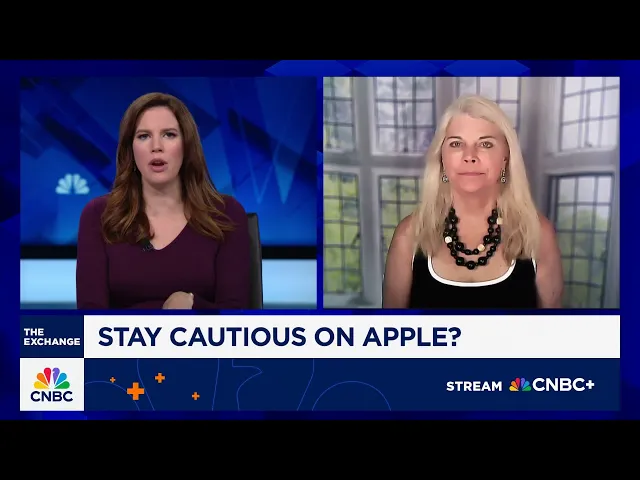Apple can’t play on the sidelines in AI race, says Needham’s Laura Martin

Apple's forced march into AI battleground
In the rapidly evolving tech landscape, no company can afford to stand still—not even Apple. The recent CNBC interview with Needham analyst Laura Martin reveals a compelling narrative about Apple's necessary pivot toward artificial intelligence amid increasing competitive pressure. As the AI race accelerates, even the world's most valuable company finds itself compelled to adapt or risk losing its premium position in the market.
Key insights from the analysis
-
Competitive pressure is forcing Apple's hand – Apple is being pushed into AI integration not by choice but by necessity, as competitors like Microsoft, Google, and Samsung aggressively incorporate AI features into their products.
-
Apple's traditional product cycle is being disrupted – The company typically operates on its own timeline for feature integration, but the rapid AI evolution is accelerating their usual measured approach.
-
Wall Street expectations are creating tension – Investors are demanding Apple demonstrate AI capabilities at WWDC to maintain its premium valuation and market position.
-
Apple faces a unique "walled garden" challenge – The company must balance its commitment to privacy and on-device processing with the cloud-dependent nature of current generative AI solutions.
The most insightful takeaway from Martin's analysis is Apple's fundamental dilemma: the company built its reputation on creating tightly controlled, privacy-focused ecosystems, but modern AI development demands cloud processing and data sharing that contradict this philosophy. This tension represents more than just a technical challenge—it's an existential one that forces Apple to reconsider its core principles.
This matters tremendously in the broader industry context because Apple has long set the standard for balancing innovation with user privacy. The company's approach to AI integration will likely establish a new paradigm for how premium tech companies navigate the trade-offs between cutting-edge AI features and user data protection. If Apple can successfully thread this needle, it may create a new competitive advantage; if it falters, we could see a significant redistribution of power in the tech ecosystem.
What the interview doesn't address is Apple's historical pattern of entering markets late but with superior execution. When Apple introduced the iPhone, smartphones already existed. When they launched Apple Pay, digital payments were established. In each case, Apple observed the market, identified pain points, and delivered more refined solutions. Their AI strategy may follow this same play
Recent Videos
How To Earn MONEY With Images (No Bullsh*t)
Smart earnings from your image collection In today's digital economy, passive income streams have become increasingly accessible to creators with various skill sets. A recent YouTube video cuts through the hype to explore legitimate ways photographers, designers, and even casual smartphone users can monetize their image collections. The strategies outlined don't rely on unrealistic promises or complicated schemes—instead, they focus on established marketplaces with proven revenue potential for image creators. Key Points Stock photography platforms like Shutterstock, Adobe Stock, and Getty Images remain viable income sources when you understand their specific requirements and optimize your submissions accordingly. Specialized marketplaces focusing...
Oct 3, 2025New SHAPE SHIFTING AI Robot Is Freaking People Out
Liquid robots will change everything In the quiet labs of Carnegie Mellon University, scientists have created something that feels plucked from science fiction—a magnetic slime robot that can transform between liquid and solid states, slipping through tight spaces before reassembling on the other side. This technology, showcased in a recent YouTube video, represents a significant leap beyond traditional robotics into a realm where machines mimic not just animal movements, but their fundamental physical properties. While the internet might be buzzing with dystopian concerns about "shape-shifting terminators," the reality offers far more promising applications that could revolutionize medicine, rescue operations, and...
Oct 3, 2025How To Do Homeless AI Tiktok Trend (Tiktok Homeless AI Tutorial)
AI homeless trend raises ethical concerns In an era where social media trends evolve faster than we can comprehend them, TikTok's "homeless AI" trend has sparked both creative engagement and serious ethical questions. The trend, which involves using AI to transform ordinary photos into images depicting homelessness, has rapidly gained traction across the platform, with creators eagerly jumping on board to showcase their digital transformations. While the technical process is relatively straightforward, the implications of digitally "becoming homeless" for entertainment deserve careful consideration. The video tutorial provides a step-by-step guide on creating these AI-generated images, explaining how users can transform...
